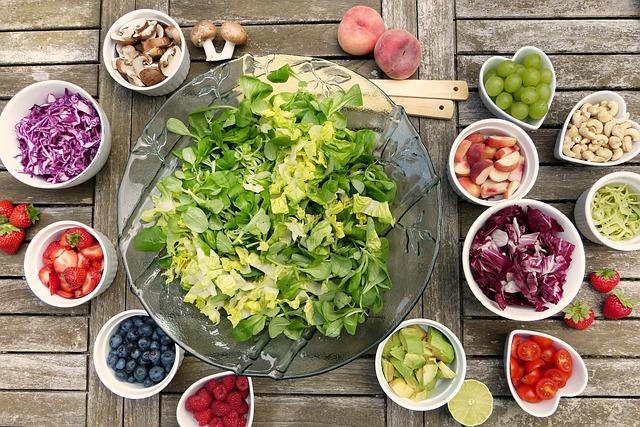In the serene world of yoga, where the mind seeks harmony and the body finds balance, the choices we make beyond the mat can often spark thoughtful debate. One such choice is the diet that accompanies a yogic lifestyle. As yoga enthusiasts dive deeper into their practice, a question arises: should they adhere to a strict vegetarian diet? This inquiry is more than just a matter of dietary preference; it intertwines with philosophy, tradition, and modern wellness. In this exploration, we unravel the complexities of this question, examining the historical roots, ethical considerations, and nutritional implications that influence whether a vegetarian diet complements the holistic journey of yoga.
Exploring the Spiritual Roots of Yoga and Vegetarianism
- Yoga and vegetarianism have long been intertwined, with roots that delve deep into ancient spiritual traditions. For many practitioners, the practice of yoga extends beyond the physical postures and breathing exercises, embodying a holistic lifestyle that includes dietary choices.
- Ahimsa, the principle of non-violence, is a core tenet of yoga philosophy. This concept encourages compassion and kindness toward all living beings, often leading yoga enthusiasts to adopt a vegetarian or vegan diet. By choosing not to consume animal products, practitioners align their eating habits with their spiritual values, fostering a sense of inner peace and connection to the world around them.
- Additionally, many yogic texts, such as the Bhagavad Gita and the Yoga Sutras of Patanjali, suggest that a vegetarian diet supports spiritual development and mental clarity. Plant-based foods are believed to promote sattva, or purity, which enhances one’s ability to meditate and engage in mindful practices.

Nutritional Benefits and Challenges of a Vegetarian Diet for Yogis
Embracing a vegetarian diet can offer numerous nutritional benefits for yogis, enhancing their practice both physically and spiritually. This plant-based lifestyle is rich in essential nutrients such as vitamins, minerals, and antioxidants, which can lead to improved energy levels and overall health. The high fiber content found in vegetables, fruits, legumes, and whole grains promotes better digestion and can contribute to a clearer mind and more focused practice. Additionally, a vegetarian diet aligns with the yogic principle of ahimsa, or non-violence, fostering a deeper connection with the ethical foundations of yoga.
However, adopting a vegetarian diet also presents certain challenges that yoga enthusiasts must navigate to maintain balanced nutrition. Potential pitfalls include deficiencies in protein, vitamin B12, iron, and omega-3 fatty acids, which are more readily available in animal products. To counter these challenges, it is crucial for yogis to incorporate a variety of plant-based protein sources such as:
- Quinoa
- Lentils
- Chickpeas
- Tofu and tempeh
- Nuts and seeds
Additionally, fortified foods or supplements may be necessary to ensure adequate intake of certain nutrients. By mindfully planning their meals, yogis can fully reap the benefits of a vegetarian diet while overcoming its challenges.

Balancing Yoga Practice with Personalized Dietary Choices
For yoga enthusiasts, the journey towards harmony between mind and body often extends beyond the mat, encompassing dietary choices that resonate with their practice. While some may gravitate towards a strict vegetarian diet, it is essential to remember that each individual’s nutritional needs and preferences can vary widely. Here are a few factors to consider when aligning your diet with your yoga practice:
- Personal Health Goals: Consider what you aim to achieve with your diet. Whether it is enhancing energy levels, improving flexibility, or supporting recovery, aligning dietary choices with personal health goals can offer tailored benefits.
- Body’s Unique Needs: Every body is different, and so are its nutritional requirements. Listening to your body and understanding its signals can help in crafting a diet that supports your yoga journey.
- Cultural and Ethical Beliefs: Your dietary choices might also reflect cultural backgrounds or ethical beliefs. Respecting these aspects can add a deeper layer of meaning to your practice.
Ultimately, a balanced approach that respects personal preferences and lifestyle choices, while considering the principles of yoga, can lead to a more fulfilling practice. Whether choosing a vegetarian diet or incorporating other food groups, the key is to maintain mindfulness and intention in every choice.

Expert Opinions and Practical Tips for Yoga Practitioners
Many yoga practitioners find themselves at a crossroads when considering dietary choices. While a vegetarian diet is traditionally associated with yoga due to its emphasis on non-violence and mindfulness, experts suggest that the decision should be personal and aligned with one’s unique body needs and lifestyle. Nutritionists emphasize the importance of a balanced diet that provides all essential nutrients, whether vegetarian or not. Yoga instructors often highlight that the key is to maintain a diet that supports your practice and overall well-being.
- Listen to Your Body: Pay attention to how different foods make you feel and adjust your diet accordingly.
- Consult Professionals: Seek advice from a nutritionist or dietitian to ensure you’re meeting your dietary needs.
- Mindful Eating: Practice mindfulness in your eating habits, savoring each bite and acknowledging the journey of your food.
- Balance is Key: Whether you choose to be vegetarian or not, aim for a diet that includes a variety of nutrients.
Key Takeaways
In the intricate dance between yoga and diet, the path is as diverse as the practitioners themselves. Whether one chooses to embrace a strict vegetarian diet or finds nourishment in a broader culinary spectrum, the essence lies in mindfulness and balance. As each yoga pose harmonizes the body and mind, so too should our dietary choices resonate with our individual values and needs. Ultimately, the journey is deeply personal, guided by the rhythms of our own lives. As you roll up your yoga mat and step back into the world, may your choices—be they on the mat or at the table—reflect the harmony and peace you seek. Namaste.

